1559
Year 1559 (MDLIX) was a common year starting on Sunday (link will display the full calendar) of the Julian calendar.
| Millennium: | 2nd millennium |
|---|---|
| Centuries: | |
| Decades: | |
| Years: |
| 1559 by topic |
|---|
| Arts and science |
| Leaders |
|
| Birth and death categories |
| Births – Deaths |
| Establishments and disestablishments categories |
| Establishments – Disestablishments |
| Works category |
|
| Gregorian calendar | 1559 MDLIX |
| Ab urbe condita | 2312 |
| Armenian calendar | 1008 ԹՎ ՌԸ |
| Assyrian calendar | 6309 |
| Balinese saka calendar | 1480–1481 |
| Bengali calendar | 966 |
| Berber calendar | 2509 |
| English Regnal year | 1 Eliz. 1 – 2 Eliz. 1 |
| Buddhist calendar | 2103 |
| Burmese calendar | 921 |
| Byzantine calendar | 7067–7068 |
| Chinese calendar | 戊午年 (Earth Horse) 4255 or 4195 — to — 己未年 (Earth Goat) 4256 or 4196 |
| Coptic calendar | 1275–1276 |
| Discordian calendar | 2725 |
| Ethiopian calendar | 1551–1552 |
| Hebrew calendar | 5319–5320 |
| Hindu calendars | |
| - Vikram Samvat | 1615–1616 |
| - Shaka Samvat | 1480–1481 |
| - Kali Yuga | 4659–4660 |
| Holocene calendar | 11559 |
| Igbo calendar | 559–560 |
| Iranian calendar | 937–938 |
| Islamic calendar | 966–967 |
| Japanese calendar | Eiroku 2 (永禄2年) |
| Javanese calendar | 1478–1479 |
| Julian calendar | 1559 MDLIX |
| Korean calendar | 3892 |
| Minguo calendar | 353 before ROC 民前353年 |
| Nanakshahi calendar | 91 |
| Thai solar calendar | 2101–2102 |
| Tibetan calendar | 阳土马年 (male Earth-Horse) 1685 or 1304 or 532 — to — 阴土羊年 (female Earth-Goat) 1686 or 1305 or 533 |
Events
January–June
- January 15 – Elizabeth I of England is crowned, in Westminster Abbey.[1]
- February 27 – Queen Elizabeth I of England establishes the Church of England, with the Act of Uniformity 1558 and the Act of Supremacy 1558. The Oath of Supremacy is reinstated.
- March 23 – Emperor Gelawdewos of Ethiopia, defending his lands against the invasion of Nur ibn Mujahid, Sultan of Harar, is killed in battle. His brother, Menas, succeeds him as king.
- April 2–3 – Peace of Cateau Cambrésis: France makes peace with England and Spain, ending the Italian War of 1551–59. France gives up most of its gains in Italy (including Savoy), retaining only Saluzzo, but keeps the three Lorraine bishoprics of Metz, Toul, and Verdun, and the formerly English town of Calais.
- May 2 – John Knox returns from exile to Scotland, to become the leader of the beginning Scottish Reformation.
- May 13 – At Basel, the body of Dutch Anabaptist leader David Joris is exhumed and burned, following his posthumous conviction of heresy.
- June 2 – A royal edict in France makes heresy punishable by death.
- June 11 – Scottish Reformation: A Protestant mob, incited by the preaching of John Knox, sacks St Andrews Cathedral.
- June 22 – King Philip II of Spain and the 14-year-old Elisabeth of Valois are married in Spain, having married by proxy in January.[2] On June 30, the bride's father, King Henry II of France, is fatally injured in a jousting accident at the celebrations.
July–December
- July 10 – Francis II becomes King of France following the death of his father, Henry II.[3][4] Members of the House of Guise and the new king's mother Catherine de' Medici dispute control over the kingdom.
- July 31 – Pope Paul IV authorizes the creation of the University of Douai (which will later become the University of Lille).[5]
- August 15 – Led by Don Tristán de Luna y Arellano, a Spanish missionary colony of 1,500 men, on 13 ships, arrives from Vera Cruz at Pensacola Bay, founding the oldest European settlement in the mainland U.S. (St. Augustine is founded in 1565.)
- September 4 – Gorkha state is established by Dravya Shah, beating local Khadka kings, which is the origin of the current country of Nepal.
- September 19 – Just weeks after arrival at Pensacola, the Spanish missionary colony is decimated by a hurricane that kills hundreds, sinks five ships, with a galleon, and grounds a caravel; the 1,000 survivors divide to relocate/resupply the settlement, but suffer famine & attacks, and abandon the effort in 1561.
- September 21 – Francis II of France is crowned at Reims. The crown is too heavy for him, and has to be held in place by his nobles.[6]
- December 25 – Pope Pius IV succeeds Pope Paul IV, as the 224th pope.
Date unknown
- End of Reformation according to many historians.[7]
- The University of Geneva is founded by John Calvin.[8]
- John Calvin publishes the final edition of the Institutes of the Christian Religion.[9]
- Oda Nobunaga wins control of his native province of Owari.
- Margaret of Parma becomes Governor of the Netherlands, in place of her brother, King Philip II of Spain.
- Jean Nicot, French ambassador to Portugal 1559–61, describes the medicinal properties of tobacco, which he introduces in the form of snuff to the French court.[10]
- Pope Paul IV promulgates the Pauline Index, an early version of the Index Librorum Prohibitorum.
Births
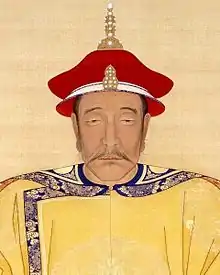
Emperor Nurhaci born on February 19
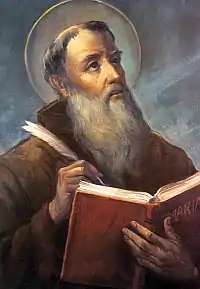
Lawrence of Brindisi born on July 22
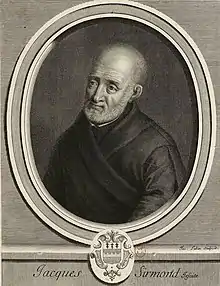
Jacques Sirmond born on October 12
- January 1 – Virginia Eriksdotter, Swedish noble (d. 1633)
- January 8 – William Helyar, English chaplain (d. 1645)
- January 25 – Aleixo de Menezes, Roman Catholic archbishop (d. 1617)
- February 7 – Catherine de Bourbon, Princess of Navarre and Duchess consort of Lorraine (d. 1604)
- February 18 – Isaac Casaubon, French-born classical scholar (d. 1614)
- February 19 – Philip II, Margrave of Baden-Baden (d. 1588)
- February 21 – Nurhaci, Chinese emperor (d. 1626)
- March 12 – Christoph Brouwer, Dutch historian (d. 1617)
- March 16 – Amar Singh I, eldest son and successor of Maharana Pratap of Mewar (d. 1620)
- March 26 – Wolf Dietrich Raitenau, Prince-Bishop of Salzburg (d. 1617)
- May 4 – Alice Spencer, Countess of Derby, Baroness Ellesmere and Viscountess Brackley (d. 1637)
- May 12
- Stanisław Radziwiłł, Grand Marshal of Lithuania (d. 1599)
- Johann Georg Gödelmann, German demonologist (d. 1611)
- July 2 – Margareta Brahe, Swedish political activist (d. 1638)
- July 22 – Lawrence of Brindisi, Italian saint (d. 1619)
- July 27 – Countess Palatine Barbara of Zweibrücken-Neuburg and Countess consort of Oettingen-Oettingen (d. 1618)
- August 18 – Frederik van den Bergh, Dutch soldier in the Eighty Years' War (d. 1618)
- August 24 or September 1556 – Sophia Brahe, Danish astronomer, horticulturalist (d. 1643)
- September 21 – Cigoli, Italian painter (d. 1613)
- September 15 – Edmond Richer, French theologian (d. 1631)
- October 12 or October 22 – Jacques Sirmond, French Jesuit scholar (d. 1651)
- November 11 – Tokuhime, Japanese noble (d. 1636)
- November 12 – Yaza Datu Kalaya, Crown Princess of Burma (d. 1603)
- November 13 – Al-Mansur al-Qasim, Imam of Yemen (d. 1620)
- November 15 – Albert VII, Archduke of Austria, Governor of the Low Countries (d. 1621)
- December 14 – Lupercio Leonardo de Argensola, Spanish writer (d. 1613)
- date unknown
- George Chapman, English dramatist (d. 1634)
- Ikeda Motosuke, Japanese military commander (d. 1584)
- John Penry, Welsh Protestant martyr (d. 1593)[11]
- Honinbo Sansa, Japanese player of Go (d. 1623)
- John Spenser, president of Corpus Christi College, Oxford (d. 1614)
Deaths

King Christian III of Denmark and Norway died on New Year's Day, January 1, 1559
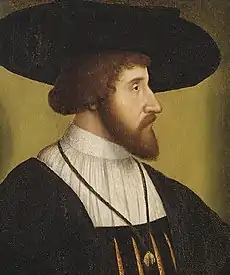
King Christian II of Denmark, Norway and Sweden died on January 25, 1559
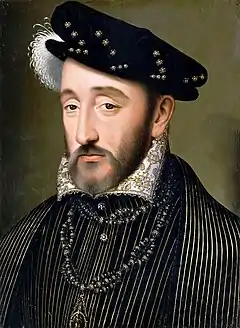
King Henry II of France died on July 10, 1559
%252C_ca._1560.jpg.webp)
Pope Paul IV died on August 18, 1559
- January – Christina Gyllenstierna, leading opponent of King Christian II of Denmark and Norway (b. 1494)
- January 1 – King Christian III of Denmark and Norway (b. 1503)[12]
- January 25 – King Christian II of Denmark, Norway and Sweden (b. 1481)
- February 12 – Prince-elector Otto Henry of the Palatinate (b. 1502)
- March 8 – Thomas Tresham, English Catholic politician
- March 13 – Johann Gropper, German Catholic cardinal (b. 1503)
- March 16 – Anthony St. Leger, Lord Deputy of Ireland (b. 1496)
- March 23 – Emperor Gelawdewos of Ethiopia (in battle) (b. 1522)
- March 30 – Adam Ries, German mathematician (b. 1492)
- June 3 – Elisabeth of Nassau-Siegen, German noblewoman (b. 1488)
- July 10 – King Henry II of France (jousting accident) (b. 1519)[3]
- August 18 – Pope Paul IV (b. 1476)[13]
- September 7 – Robert Estienne, French printer (b. 1503)
- September 15 – Isabella Jagiellon, queen consort of Hungary (d. 1519)
- October 2 – Jacquet of Mantua, French composer (b. 1483)
- October 3 – Ercole II d'Este, Duke of Ferrara, Italian noble (b. 1508)
- October 4 – Philip III, Count of Nassau-Weilburg (b. 1504)
- October 6 – William I, Count of Nassau-Siegen (b. 1487)
- November 5 – Kanō Motonobu, Japanese painter (b. 1476)
- November 10 – Jacob Milich, German astronomer and mathematician (b. 1501)
- November 18 – Cuthbert Tunstall, English church leader (b. 1474)
- November 20 – Frances Grey, Duchess of Suffolk, English noblewoman and claimant to the throne of England (b. 1517)
- November 26 – Adolph of Nassau-Saarbrücken, Count of Nassau (b. 1526)
- December 17 – Irene di Spilimbergo, Italian Renaissance poet and painter (b. 1538)
- December 31 – Owen Oglethorpe, deposed English bishop
- date unknown
- Realdo Colombo, Italian surgeon and anatomist (b. 1516)
- Elizabeth Wilford, English merchant and company founder
- Father Francis of Aberdeen, Catholic Trinitarian friar
- Leonard Digges, English mathematician and surveyor (b. c. 1515)
- Conn O'Neill, 1st Earl of Tyrone, Irish rebel (b. 1480)
- Wen Zhengming, Chinese painter (b. 1470)
References
- Geoffrey Abbott (2001). Crowning Disasters. Capall Bann Publishing. p. 56. ISBN 978-1-86163-132-9.
- Jean d' Aubusson de la Maison Neuve; Victor Ernest Graham; Victor E. Graham (1979). Recueil Et Discours Du Voyage Du Roy Charles IX. University of Toronto Press. p. 457. ISBN 978-0-8020-5406-7.
- "Henry II | king of France". Encyclopedia Britannica. Retrieved April 10, 2019.
- "Francis II | king of France". Encyclopedia Britannica. Retrieved April 10, 2019.
- Escallier, Énée Aimé (1852). L'abbaye d'Anchin, 1079-1792 (in French). L. Lefort.
- Guy, John, My Heart is my Own, London, Fourth Estate, 2004, ISBN 1841157538
- G.R. Elton, ed. The New Cambridge Modern History, Vol. 2: The Reformation, 1520–1559 (1st ed. 1958); Lewis Spitz, The Protestant Reformation: 1517–1559 (2003).
- Mark Pattison (1875). Isaac Casaubon, 1559-1614. Longmans, Green. p. 11.
- John Calvin : for a new reformation. Derek Thomas. Wheaton, Illinois. 2019. ISBN 978-1-4335-1281-0. OCLC 1091236732.
{{cite book}}: CS1 maint: location missing publisher (link) CS1 maint: others (link) - Austin, Gregory. "Chronology of Psychoactive Substance Use". Drugs & Society. Comitas Institute for Anthropological Study. Archived from the original on October 12, 2011. Retrieved October 7, 2011.
- Robert Tudur Jones. "Penry, John (1563-1593), Puritan author". Welsh Biography Online. Retrieved May 26, 2021.
- Alexander Hopkins McDannald (1945). The Encyclopedia Americana. Americana Corporation. p. 599.
- "Paul IV | pope". Encyclopedia Britannica. Retrieved July 13, 2021.
This article is issued from Wikipedia. The text is licensed under Creative Commons - Attribution - Sharealike. Additional terms may apply for the media files.
